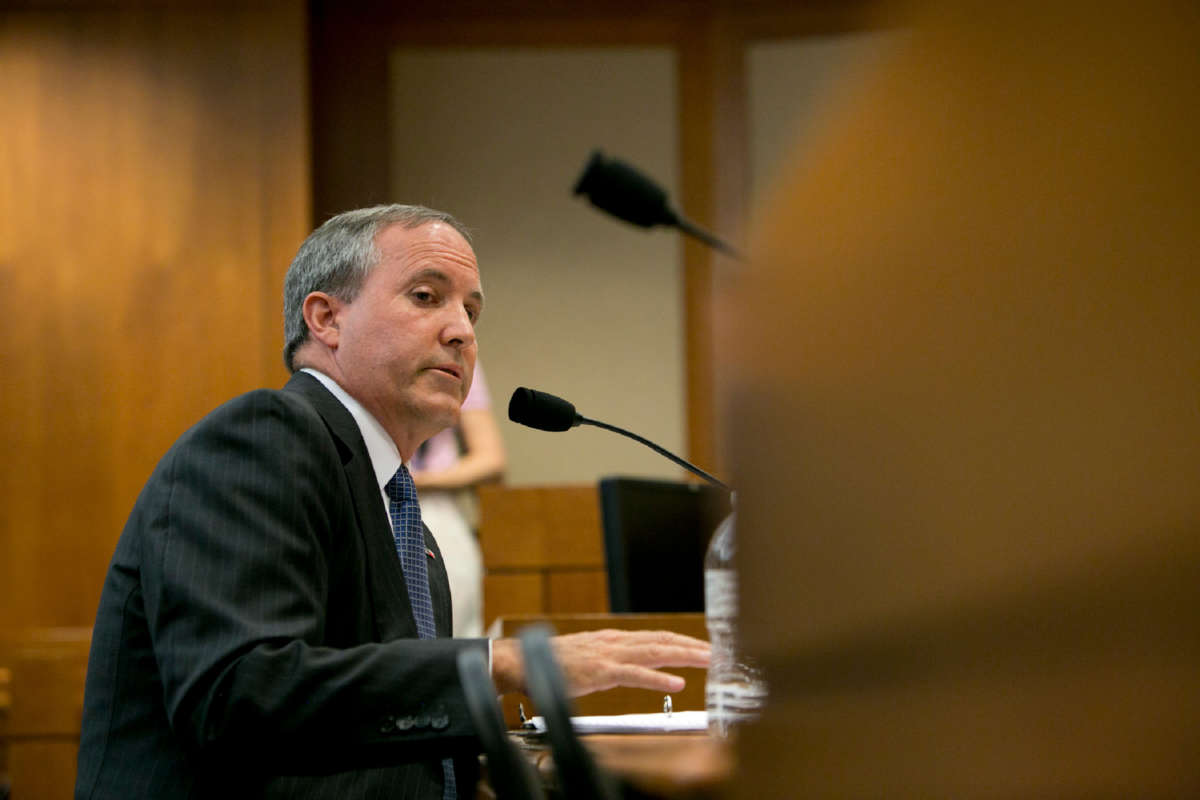Texas Attorney General Ken Paxton is suing four states over their 2020 presidential election results, submitting his complaint directly to the United States Supreme Court with hopes that justices will invalidate legitimate votes by residents in those states on the baseless and unsubstantiated argument that election fraud took place.
Paxton’s lawsuit alleges that changes to election law (made to allow residents to vote under conditions created by a pandemic) in the states he’s suing were made in violation of federal statutes. Those changes, the Texas attorney general goes on to say, resulted in voter fraud, a claim that President Donald Trump and his allies have made countless times in the past several weeks without any evidence.
The complaint Paxton submitted to the Supreme Court requests that the election results in four states — Georgia, Wisconsin, Pennsylvania and Michigan — be tossed out completely, and that the state legislatures of those states determine instead which candidate (Trump, or President-elect Joe Biden) should win their Electoral College votes.
Perhaps by design, the lawsuit does not target or seek to overturn election results in states where laws may also have been changed but where Trump secured a victory. The four jurisdictions listed in the suit are also states where legislatures are currently controlled by the Republican Party.
The lawsuit, if successful, would almost assuredly result in Trump winning the 62 Electoral College votes those four states represent, in turn giving the incumbent president a victory instead of a loss in the 2020 presidential election.
Attorneys general from both parties representing the states listed in the lawsuit were quick to denounce the blatant attempt to thwart the will of voters.
“Mr. Paxton’s actions are beneath the dignity of the office of Attorney General and the people of the great state of Texas,” Michigan Attorney General Dana Nessel, a Democrat, said in a statement, adding that she viewed Paxton’s lawsuit as a “publicity stunt.”
Georgia Attorney General Christopher Carr, a Republican, echoed Nessel’s sentiments. “With all due respect, the Texas Attorney General is constitutionally, legally and factually wrong about Georgia,” Carr said.
Josh Kaul, the Democratic attorney general from the state of Wisconsin, expressed his sympathy for Paxton’s constituents. “I feel sorry for Texans that their tax dollars are being wasted on such a genuinely embarrassing lawsuit,” Kaul said.
And Pennsylvania Attorney General Josh Shapiro, also a Democrat, lashed out at the claims made in Paxton’s lawsuit.
“These continued attacks on our fair and free election system are beyond meritless, beyond reckless — they are a scheme by the President of the United States and some in the Republican party to disregard the will of the people — and name their own victors,” Shapiro wrote in a tweet.
The chances of the Supreme Court hearing the lawsuit from Texas (or any other lawsuit disputing the election outcome) are very slim, especially given how frequently errant claims of voter fraud affecting the race’s outcome have failed to gain any traction whatsoever in lower appellate courts.
For the High Court to accept a case, at least four justices must vote to grant a writ of certiorari which amounts to the court agreeing to review the case. And while Trump has appointed three of the nine justices on the Court, such a move absent evidence of actual fraud would be an extraordinary move for members of the bench to make.
Indeed, University of Texas Law School professor Steve Vladeck expressed skepticism of the Supreme Court accepting the case. “Spoiler alert: The Court is *never* going to hear this one,” Vladeck tweeted on Tuesday.
Our most important fundraising appeal of the year
December is the most critical time of year for Truthout, because our nonprofit news is funded almost entirely by individual donations from readers like you. So before you navigate away, we ask that you take just a second to support Truthout with a tax-deductible donation.
This year is a little different. We are up against a far-reaching, wide-scale attack on press freedom coming from the Trump administration. 2025 was a year of frightening censorship, news industry corporate consolidation, and worsening financial conditions for progressive nonprofits across the board.
We can only resist Trump’s agenda by cultivating a strong base of support. The right-wing mediasphere is funded comfortably by billionaire owners and venture capitalist philanthropists. At Truthout, we have you.
We’ve set an ambitious target for our year-end campaign — a goal of $250,000 to keep up our fight against authoritarianism in 2026. Please take a meaningful action in this fight: make a one-time or monthly donation to Truthout before December 31. If you have the means, please dig deep.
